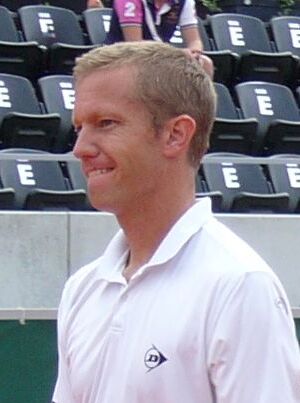Top Qs
Timeline
Chat
Perspective
Thomas Johansson
Swedish tennis player (born 1975) From Wikipedia, the free encyclopedia
Remove ads
Karl Thomas Conny Johansson (pronounced [ˈtʊ̌mːas ˈjûːanˌsɔn]; born 24 March 1975) is a Swedish former professional tennis player and coach. He reached a career-high Association of Tennis Professionals (ATP) world No. 7 singles ranking in May 2002. His career highlights in singles include a major title at the 2002 Australian Open, and a Masters title at the 1999 Canada Masters. He also won a silver medal at the 2008 Beijing Olympics in men's doubles, partnering Simon Aspelin. As of 2025, Johansson remains the last Swedish man to win a major in singles.
Johansson began coaching Sorana Cîrstea in 2022.[1] Since 2024, he is coaching Kei Nishikori.[2]
Remove ads
Tennis career
Summarize
Perspective
Juniors
Johansson began to play tennis at age five with his father, Krister. In 1989, became European 14s singles champion and won doubles title (with Magnus Norman). Even when he injured his right elbow while playing the Orange Bowl tennis championships 16s in 1991, he still reached the final, losing to Spain's Gonzalo Corrales. He finished No. 10 in the 1993 world junior rankings.
Professional career
That same year he joined the pro tour for the first time, and turned pro the following year. He has managed to win 9 top-level singles titles and 1 doubles title, including the 1999 Canada Masters, defeating world No. 4 Yevgeny Kafelnikov from a set down, and the 2002 Australian Open, which he unexpectedly won (while having never progressed beyond the quarterfinals of any of his 24 previous Grand Slams) after defeating Jacobo Díaz, Markus Hipfl, Younes El Aynaoui, Adrian Voinea, Jonas Björkman and Jiří Novák before defeating his heavily favored opponent in the final, Marat Safin, in four sets, again from a set down. Johansson became the first Swedish player to win a Slam since Stefan Edberg won the 1992 US Open title, and the first Swede to claim the Australian Open since his idol Mats Wilander in 1988.
A knee injury robbed Johansson of the latter half of the 2002 season and all of 2003, and Johansson was therefore unable to compete until the start of 2004. Many people weren't sure if Johansson will be able to compete again because of the seriousness of the injury. In 2005, he made a comeback to become the first Swedish player to reach the semifinals at Wimbledon since Edberg in 1993, and only dropped a set en route, losing to 2nd seed Andy Roddick in a tightly contested four set match that lasted a minute under 3 hours, 7–6(8–6), 2–6, 6–7(8–10), 6–7(5–7). Near the end of the season, Johansson won his 9th and last ATP tour title in St. Petersburg, defeating Nicolas Kiefer in straight sets.
In 2006, the Swede struggled through the season after suffering an eye injury early in the season. The highlights of the season were a 4th round at the Australian Open (where he lost to Ivan Ljubičić), his first doubles title in Båstad, Sweden with countryman Jonas Björkman, and a final in St. Petersburg (lost to Mario Ančić), where he was the defending champion.
At the 2008 Beijing Summer Olympics he reached the doubles final with Simon Aspelin, where he lost against the Swiss team of Roger Federer and Stan Wawrinka in 4 sets.
As of 6 March 2009, he has an 18–15 career Davis Cup record (17–12 in singles) in 17 ties, having played for Sweden every year other than 2003 (when he was out of action for the entire season) since 1998, and a 356–292 career overall.
He announced his retirement in June 2009 after a 15-year career.
Remove ads
Personal life
His idol while growing up was Mats Wilander, who was the captain of Swedish Davis Cup team. He is also a keen player of golf and floorball, and a fan of ice hockey. He scored two goals and assisted on another in 6–5 win by ATP Stars over National Hockey League Players in an annual street hockey challenge in Montreal in 2001.[citation needed] He married Gisella Kaltenecker on 3 December 2005.
Equipment
He is sponsored by Dunlop Sport for racquets and apparel, and Adidas for shoes. He uses a heavily modified Dunlop Pro Revelation racquet 'paintjobbed' to look like the current Dunlop 4D Aerogel 500 racquet.
Significant finals
Grand Slam finals
Singles: 1 (1 title)
ATP Masters Series finals
Singles: 1 (1 title)
Olympics
Doubles: 1 (1 Silver)
ATP career finals
Singles: 14 (9 titles, 5 runner-ups)
Doubles: 2 (1 title, 1 runner-up)
Remove ads
ATP Challenger and ITF Futures finals
Singles: 4 (3–1)
Doubles: 3 (2–1)
Remove ads
Performance timelines
Summarize
Perspective
Singles
| W | F | SF | QF | #R | RR | Q# | P# | DNQ | A | Z# | PO | G | S | B | NMS | NTI | P | NH |
(W) winner; (F) finalist; (SF) semifinalist; (QF) quarterfinalist; (#R) rounds 4, 3, 2, 1; (RR) round-robin stage; (Q#) qualification round; (DNQ) did not qualify; (A) absent; (NH) not held; (SR) strike rate (events won / competed); (W–L) win–loss record.
Davis Cup matches are included in the statistics.
Doubles
Remove ads
Top 10 wins
| Season | 1993 | 1994 | 1995 | 1996 | 1997 | 1998 | 1999 | 2000 | 2001 | 2002 | 2003 | 2004 | 2005 | 2006 | 2007 | 2008 | 2009 | Total |
| Wins | 0 | 0 | 0 | 1 | 0 | 6 | 2 | 4 | 6 | 0 | 0 | 2 | 3 | 0 | 2 | 1 | 0 | 27 |
Remove ads
See also
References
External links
Wikiwand - on
Seamless Wikipedia browsing. On steroids.
Remove ads

